Serbia offers an attractive real estate market for foreign investors, characterized by a dynamic landscape and accessible investment opportunities. Buying property as a non-resident in Serbia is feasible, provided certain legal and factual conditions are met. The principle of reciprocity is central to the foreign ownership of property in Serbia, allowing foreign nationals to buy, sell, and rent out real estate provided that Serbian citizens share the same rights in their home country.
Foreigners looking to buy a home in Serbia as a non-resident will find no minimum investment threshold for obtaining residence by investment. The average cost of housing per square meter in Serbia stands at €1,5681, with premium properties in central Belgrade costing significantly more. In Belgrade, property prices range from 100,000 to 250,000 RSD per square meter, while in Novi Sad, prices vary from 80,000 to 180,000 RSD per square meter1. These figures highlight the diverse investment opportunities available across different cities in Serbia.
The Serbian real estate market also ensures flexibility for foreign legal persons who can own real estate if they own or operate businesses in the country. Special Purpose Vehicles (SPVs) are often utilized to bypass any ownership restrictions, making it feasible for international investors to enter the market. For detailed information on acquiring property, visit Zunic Law .
Key Takeaways: How to Buy a Property in Serbia
- Foreigners can buy real estate in Serbia under the principle of reciprocity.
- Average housing costs in Serbia are €1,568 per square meter1.
- Legal entities can own property if they operate a business in Serbia.
- Investment opportunities vary by city, with Belgrade and Novi Sad being prime locations1.
- Utilize SPVs to navigate ownership restrictions.
Contact us if you are Interested in Buying Property Abroad!
Understanding the Serbian Real Estate Market
The Serbian real estate market has experienced dynamic growth, making it an attractive destination for potential investors. Key cities such as Belgrade and Novi Sad illustrate a robust upturn in construction and demand, highlighting immense investment opportunities in Serbia.
Current Market Trends
In recent years, Serbia’s real estate market has shown impressive growth, with forecasts predicting an annual growth rate of 1.82% from 2024 to 20282. During 2022, an astonishing 29,659 new apartments were constructed, showcasing the ongoing development boom, a trend that continues through 2023.
Moreover, real estate in Belgrade outside the city center offers higher rental yields compared to other capital cities like London, Munich, and Sydney2. This distinction underscores the favorable conditions for investment opportunities in Serbia.
Comparatively lower average house prices further enhance Serbia’s appeal, with Belgrade’s city center averaging €3,710 per square meter and €2,200 outside the city center3. This is notably more affordable than the average property prices in the United States, making Serbia a competitively priced market within Europe.
Popular Investment Destinations
Belgrade, Novi Sad, and Niš stand out as prime locations for real estate investments. Belgrade, the capital city, not only attracts due to its economic and cultural significance but also for its high rental yields and potential for capital appreciation2. Novi Sad follows closely, with its vibrant IT hub status and affordable property prices averaging €236,000 for a 100 square meter property, making it a lucrative spot for investment3. Niš, known for its rich historical backdrop, presents an average property price of €163,000 for the same area size, reflecting another viable opportunity3.
These cities highlight the inherent value and potential in the Serbian real estate market, drawing foreign investors who see promising returns and profitable ventures on the horizon.
The Legal Framework for Foreign Ownership of Property in Serbia
In Serbia, the legal framework for property investment plays a crucial role for foreign individuals looking to purchase real estate. The Legal framework for property investment in Serbia is grounded in the principle of reciprocity, meaning that foreign nationals can buy property in Serbia if Serbian citizens are allowed to acquire property in the foreigner’s home country. This rule is established through various bilateral agreements and is subject to verification by the Serbian Ministry of Justice.
Reciprocity Principle
The reciprocity principle ensures a balanced approach to foreign property ownership, requiring factual reciprocity for investment activities. Foreigners often need to verify that Serbian citizens can purchase property in their home countries before being granted ownership rights in Serbia. This principle reflects Serbia’s adherence to international standards and helps maintain a level playing field for foreign investors. Detailed regulations were further outlined following the Stabilization and Association Agreement with the EU signed in September 2013, which set a legislative adjustment deadline for September 20174.
Legal Requirements for Foreign Buyers
Meeting the legal requirements for foreigners purchasing real estate in Serbia involves several crucial steps and regulations:
- Foreign buyers must ensure factual reciprocity through verification by Serbian authorities.
- There are restrictions on owning agricultural land according to the Law on Agricultural Land5.
- The legal framework entails compliance with the Law on Basics of Property Relations, enacted in 1980, and the Law on Planning and Construction, enacted in 20094.
- Notary fees for real estate transactions can vary significantly depending on the property’s value, adding another layer of consideration for foreign investors5.
- Foreign citizens are subject to the same annual property taxes as domestic citizens, calculated based on the assessed value and varying by property type and location5.
For more detailed information on real estate ownership and inheritance in Serbia, you can explore this comprehensive resource4.
Can Foreigners buy Real Estate in Serbia?
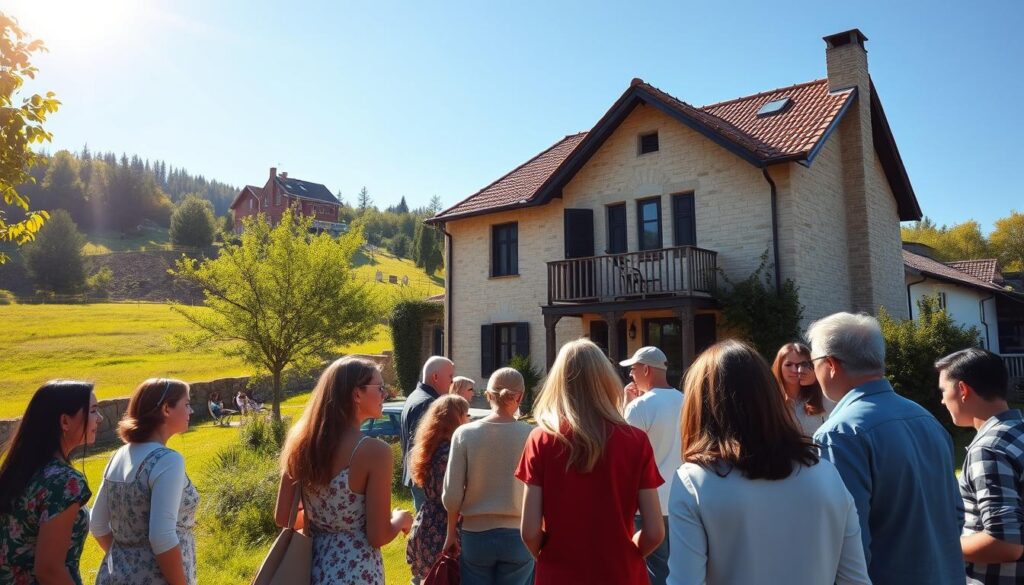
Foreign nationals have the privilege to purchase residential properties in Serbia, including apartments and traditional homes, under the reciprocity law which states that Serbian citizens must be able to buy property within the foreign national’s home country. For non-citizens purchasing property in Serbia, it’s essential to understand the property market regulations for foreigners in Serbia. According to these regulations, foreign legal entities conducting business activity in Serbia can acquire ownership rights on immovable properties necessary for conducting their activity6.
Foreign nationals who do not conduct business in Serbia may still acquire ownership rights over flats and apartment buildings under the reciprocity terms similar to Serbian citizens6. However, there are some restrictions on land purchases, particularly agricultural land, which foreign individuals cannot own unless specified by law or relevant agreements6. Still, these individuals can transfer ownership rights to domestic persons or eligible foreign individuals through legal transactions6.
An important aspect is the establishment of a local legal entity, which can facilitate the acquisition of property by non-citizens. Forming a local company enables foreigners to bypass some of the limitations imposed on property ownership6. For those interested in delving deeper into these regulations, the Ministry of Trade, Tourism, and Telecommunications of Serbia provides opinions on whether the immovable property acquired is essential for conducting activities of foreign individuals or entities6.
Reciprocity is a cornerstone in the regulation of property ownership rights for foreigners in Serbia, with confirmed agreements with countries like the United States, the Netherlands, and Japan6. It’s also noteworthy that property market regulations for foreigners in Serbia facilitate acquiring property through inheritance under reciprocity conditions, regulated by bilateral agreements with nations such as Austria, Belarus, Bulgaria, the USA, and Canada6.
When talking about financing, non-residents and foreigners can obtain home loans in Serbia. The minimum down payment requirement for securing a loan is 30%, with APN Bank offering up to €100,000, while Bank Postanska Stedionica and Banca Intesa provide up to €500,000 in home loans7. Repayment terms vary from up to 10 years to up to 20 years depending on the bank and the applicant’s status7.
For further insights on investment opportunities in Serbian real estate and obtaining residency through property ownership, detailed guidance is available at this website.
Steps to Buying Property as a Non-Resident in Serbia
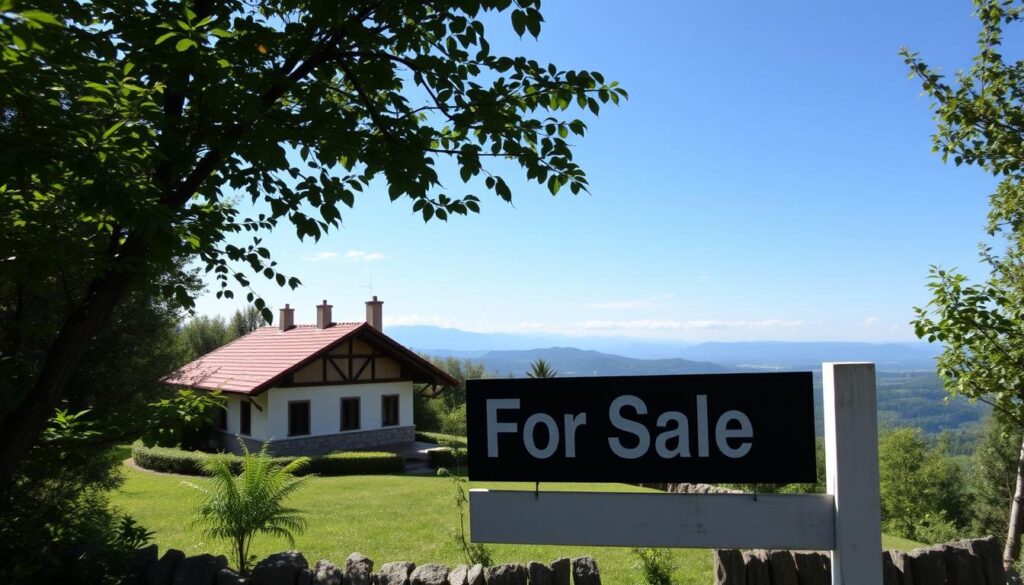
Buying property in Serbia as a non-resident involves several meticulous steps to ensure a smooth and compliant real estate transaction in Serbia. Below, we delve into the crucial phases involved in purchasing property.
Searching for Property
The first step in acquiring real estate as a non-resident is to search for available properties. You can begin by exploring local listings or hiring a real estate agent who specializes in assisting foreign buyers. Using a reputable agent can help navigate the complexities of finding suitable properties while ensuring that all legalities are respected. Additionally, Serbia’s property prices are relatively affordable, without any minimum investment requirements, making the real estate sector accessible to various budgets8.
Legal and Financial Considerations
Ensuring legal compliance is paramount. This involves verifying the property’s legality, ownership, and any potential encumbrances. Foreign buyers should be aware of the tax on the transfer of absolute rights, equivalent to 2.5% of the property value9. It’s advisable to seek legal representation to draft the purchase agreement and confirm that these documents meet Serbian regulations. The official costs include contract certification fees and potential interpreter services, which can add up to 60-80 euros per hour9.
Furthermore, if financing is needed, foreign citizens have access to two types of housing loans in Serbia: dinar and foreign currency loans. Dinar loans require a 25% down payment with a maximum term of 240 months and a variable interest rate9. On the other hand, foreign currency loans in euros necessitate a similar down payment but offer a repayment period of up to 360 months9. To qualify, borrowers need to furnish proof of current employment, bank statement history, and other relevant documentation9.
Finalizing the Purchase
Once the purchase agreement is prepared, it needs to be notarized before a notary public. Afterward, the buyer is responsible for paying the transfer tax and registering the ownership with the Real Estate Cadastre. Foreign buyers are required to provide their passport, and if not present in Serbia, a Power of Attorney can be used for representation. It’s essential to note that there is no restriction on the location of properties for foreigners, and residency approval can be obtained within a maximum of 40 days after application submission8.
Buying property in Serbia as a non-resident can also pave the way for obtaining a temporary residence permit, which is valid for 12 months and renewable thereafter8. Investing in Serbian real estate offers a viable option for long-term stays in the country, with opportunities for future citizenship following five years of holding permanent residency8.
For more comprehensive information, you may visit this guide on buying property in which discusses the detailed process and essential advice for foreign buyers.
Types of Properties Available for Foreigners
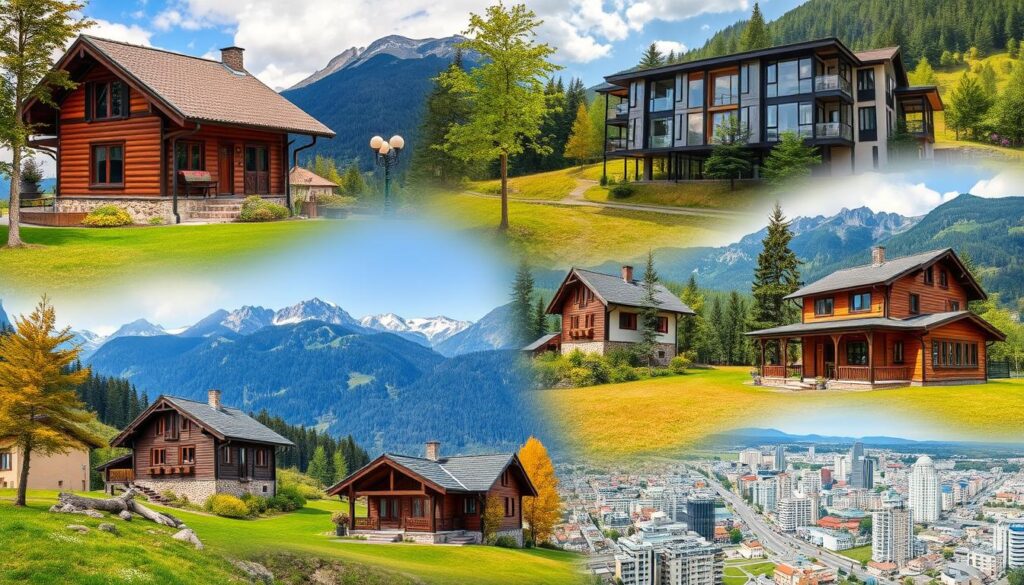
The Serbian real estate market caters to diverse preferences, offering a wide array of types of properties available in Serbia. From bustling urban areas to picturesque rural settings, there is something for every potential buyer.
Apartments in Urban Areas
Urban areas, particularly Belgrade, offer numerous apartments suitable for foreign buyers. These areas are attractive due to their vibrant city life and close proximity to cultural and commercial centers. In Belgrade, real estate prices are around 2500 euros per square meter, which reflects the premium status of properties in the capital city10. This makes apartments in Belgrade a popular choice for those looking to invest in the Serbian market. Other cities in Serbia offer prices varying from 1000 to 2000 euros per square meter, showcasing more affordable options while still providing excellent investment opportunities10.
Detached Houses and Traditional Homes
For those interested in more spacious living arrangements, detached houses and traditional homes are abundant throughout Serbia. These properties often feature the charm of traditional Serbian architecture, constructed from local materials like wood and stone. Apart from urban properties, traditional village homes, known as “kućas,” offer authentic living experiences that attract those looking to immerse themselves in the local culture. Detached houses are especially appealing for their privacy and the opportunity to enjoy more substantial plots of land.
Overall, the types of properties available in Serbia are quite varied, providing ample opportunities for investment. Apartments and houses for sale in Serbia accommodate both modern urban living and serene traditional lifestyles, making the country an appealing destination for many foreign buyers. Continuous growth in the Serbian real estate market is supported by favorable laws and an inviting cultural landscape, ensuring ongoing interest from international investors.
Investment Opportunities in Serbian Real Estate
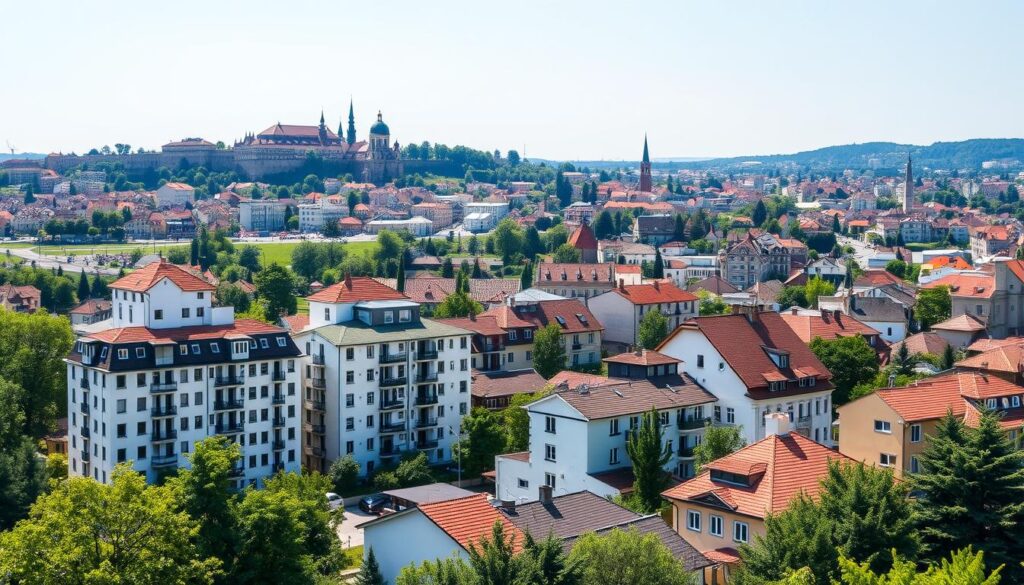
Serbia presents numerous impressive real estate investment opportunities, particularly attractive for both residential and commercial sectors. Combining appealing property prices with strategic potential, investors are drawn to the promising returns offered by the market.
Residential vs. Commercial Investments
In Serbia, investors can focus on either residential or commercial real estate properties. Belgrade, the bustling capital city, boasts significant rental yields in both segments. For instance, properties located outside Belgrade’s city center offer higher rental yields compared to similar urban areas in major capitals like London, Munich, and Sydney2.
The real estate market in Serbia is forecasted to grow at an annual rate of 1.82 percent from 2024 to 2028, reflecting a steady interest in the property sector2. Notably, commercial properties, including office spaces and retail outlets, offer lucrative investment opportunities due to Belgrade’s expanding economic activities and increasing demand for modern commercial infrastructure.
Contact us if you are Interested in Buying Property Abroad!
High Rental Yields and Capital Appreciation
Serbian real estate investment opportunities are underscored by high rental yields and potential for capital appreciation. In urban centers like Belgrade, a surging rental market driven by an influx of international tenants, including approximately 200,000 Russians, reflects a robust demand11. This influx, alongside strong local demand, has driven up rental prices significantly. For example, the average rental yields for Belgrade properties are competitive compared to other key European capitals2.
Another attractive aspect of investing in Serbia’s real estate is the potential for capital appreciation as the country continues its journey toward EU membership. This progression is expected to further elevate property values, adding to the allure of Serbian property investment. Foreign investments in Serbian real estate have shown a steady increase, reflecting growing international confidence in the market12.
Moreover, Serbia’s real estate market stands out for its relatively low property taxes and transfer fees. The property transfer tax is 2.5 percent of the property value, and there is an annual property tax of 0.4 percent for residential and 0.8 percent for commercial properties212. This tax structure offers additional investment appeal.
The average house prices in Belgrade range from €2,200 per square meter outside the city center to €3,710 per square meter within the city center2. These prices, coupled with the availability of competitively priced mortgages between 3-4 percent for both residents and non-residents11, make Serbian property investment highly attractive.
Taxation and Fees for Foreign Property Buyers
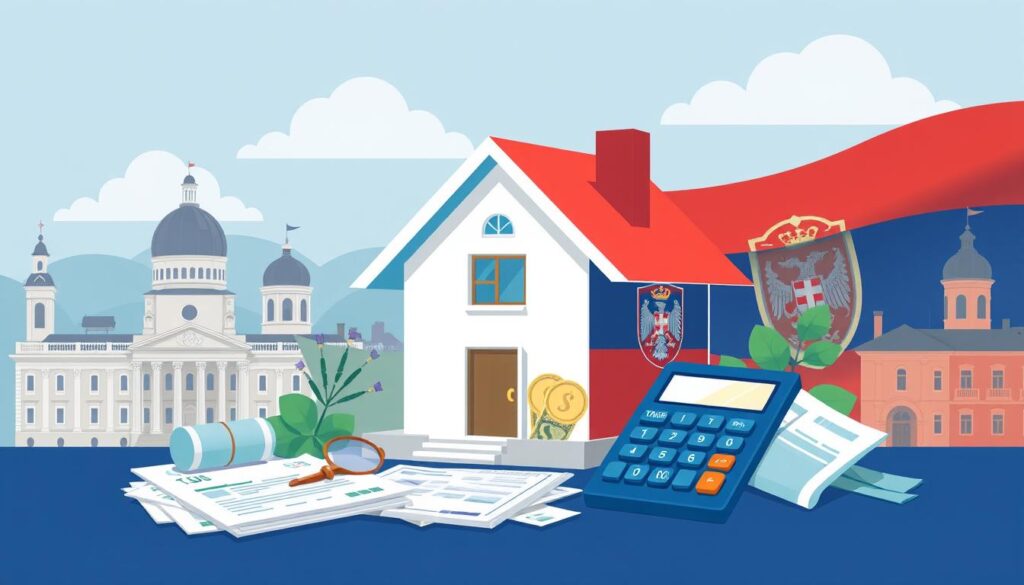
When purchasing real estate in Serbia, foreign buyers need to be aware of various taxes and fees that apply. These costs can significantly impact the overall investment, hence understanding them is crucial for informed decision making.
VAT and Transfer Taxes
The acquisition of properties in Serbia typically involves the payment of a Value Added Tax (VAT) or a transfer tax. For secondary properties, buyers are required to pay a transfer tax of 2.5% of the stipulated purchase price or the market value of the real estate13. On the other hand, purchasing new buildings incurs a 10% VAT, which is a notable consideration for those investing in newly constructed properties14. Additionally, the Notary Public must submit the filled tax return for the tax on the transfer of absolute rights to the competent tax authorities within 24 hours, ensuring that the tax process is prompt and efficient13.
Annual Property and Rental Income Tax
Beyond the initial purchase taxes, real estate owners in Serbia are also subject to annual property taxes. The rate of property tax is set at 0.4% for real estate valued up to 10 million dinars13. This rate makes real estate taxes in Serbia among the lowest in Europe, creating an attractive environment for investors14. Furthermore, rental income from properties is taxed at a rate of 20% for non-resident landlords14. This tax framework aims to ensure that all property owners, whether local or foreign, contribute fairly to the national revenue while maintaining favorable conditions for real estate investments.
Residency and Citizenship by Real Estate Investment
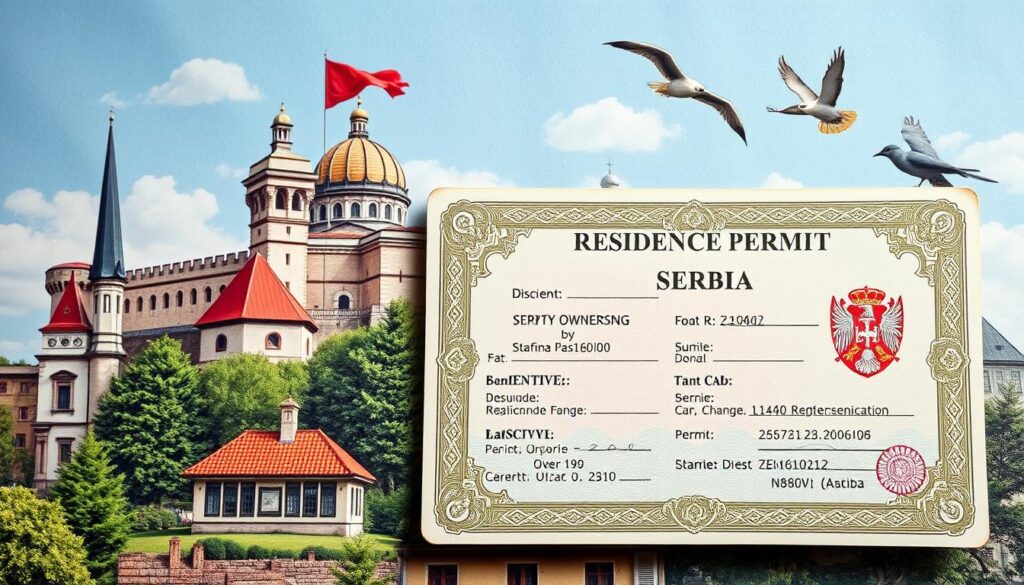
Obtaining a Serbia residence permit can be a straightforward process for foreign investors, especially those considering citizenship by real estate investment in Serbia. Serbia offers a pathway to residency and eventual citizenship for individuals who purchase property in the country. There is no minimum property value requirement, making it an accessible option for many investors15.
Foreign investors can apply for temporary residence permits, which are usually granted for a year and can be renewed three months before they expire16. After holding temporary residency for five years, an individual can apply for permanent residency, provided they have stayed in Serbia for at least half of that period1615. This pathway is further eased by Serbia’s relatively low tax rate of 15%, making it a financially attractive option for residency15.
Serbia also facilitates the naturalization of its residents, with the total process taking up to eight years for those seeking Serbian citizenship16. The process is quite streamlined: once temporary residency is secured, investors can smoothly transition to permanent residency and eventually citizenship, based on their continuous stay and compliance with Serbian laws. One significant advantage is that Serbia allows dual citizenship in certain cases, offering flexibility for investors who wish to retain their original nationality16.
For more detailed guidance, assistance is available throughout the entire process, from purchasing property to navigating legal, tax, and residency permit procedures. Detailed instructions and further insights can be found by visiting this link16. Through this comprehensive support, foreign investors can confidently pursue their residency and potential citizenship goals in Serbia.
Challenges and Considerations for Foreign Buyers
Foreigners buying property in Serbia often face various challenges, highlighting the importance of understanding the local market dynamics and legal requirements. Specific considerations for foreign real estate buyers involve dealing with language barriers and navigating the cultural landscape.
Language and Cultural Barriers
One significant challenge in buying property in Serbia is overcoming the language and cultural barriers. While many Serbians speak English, non-residents might still encounter difficulties in fully understanding legal documents and real estate jargon. Hiring real estate agents who speak the buyer’s language can greatly facilitate the process17. Additionally, understanding the local customs and negotiating styles is crucial for smooth transactions. This is where cultural awareness can make a substantial difference.
Legal and Bureaucratic Hurdles
Foreign property buyers must also navigate the complexities of Serbia’s legal and bureaucratic systems. The “Prethodna Saglasnost” is a vital document required in certain areas, particularly for foreigners18. Overlooking this requirement is a common mistake due to unfamiliarity with Serbia’s unique administrative procedures18. Similarly, the “Uslovna Gradjevinska Dozvola,” or “Conditional Construction Permit,” must be secured for projects needing additional approvals before construction can start18.
Another critical consideration for foreign real estate buyers is the legalization of buildings, or “legalizacija”18. Unauthorized constructions must comply with Serbian building and zoning laws, and failure to verify a property’s legal status can lead to legal challenges18. Ensuring due diligence by verifying planning and construction permits is essential18. Engaging local professionals, such as property lawyers or surveyors with expertise in Serbian property laws, is highly recommended to navigate these pitfalls effectively18.
In addition to legal requirements, foreign buyers should be aware of the necessary documentation for property transactions in Serbia. This typically includes a valid passport or ID card, proof of income, and sometimes a local guarantor17. Taxes and fees, such as a transfer tax and notary fees, also constitute important financial considerations for foreign real estate buyers17. Thorough research and due diligence can greatly assist in making informed decisions.
Best Cities to Buy Property in Serbia
When considering the best cities in Serbia for real estate investment, three prominent cities stand out: Belgrade, Novi Sad, and Niš. Each city offers unique advantages that cater to different investment needs, blending history, culture, and economic potential.
Belgrade: The Capital City
Belgrade, known for its vibrant lifestyle and dynamic economic environment, has become a magnet for real estate investors. The city’s substantial demand for properties spans various municipalities, with Stari Grad, Vračar, Belgrade Waterfront, and New Belgrade being the most sought-after areas19. These regions are recognized for retaining and increasing property value, thanks to their amenities and excellent connectivity to the city center19. Notably, the price per square meter in Belgrade is continually rising due to the increasing costs of construction materials, making it a highly lucrative investment20.
Novi Sad: The IT Hub
Novi Sad, designated as the European Capital of Culture in 2021, has evolved into a significant IT hub in Serbia. The city’s increasing economic importance and vibrant cultural scene make it an attractive option for property investment19. Investors are drawn to Novi Sad due to its potential for sustainable growth and high rental yields. This city’s modern infrastructure, coupled with affordable property prices compared to Belgrade, presents lucrative opportunities for both residential and commercial investments.
Niš: The Historical Jewel
Niš, a city with rich historical significance, offers unique real estate opportunities. Its appeal lies in its historical charm and growing tourist industry, making it an ideal location for rental properties19. Niš provides a lower entry point for investors compared to Belgrade and Novi Sad, while still promising significant returns. The city’s strategic location and continued development enhance its attractiveness as a viable investment destination.
Investing in the best cities in Serbia for real estate investment, such as Belgrade, Novi Sad, and Niš, combines strong economic potential, cultural richness, and promising returns. Each city offers unique advantages, catering to diverse investment strategies and objectives, whether aiming for rental income, capital appreciation, or a blend of both.
| City | Key Features | Investment Potential |
|---|---|---|
| Belgrade | Economic growth, rising property prices, modern living | High |
| Novi Sad | IT hub, cultural significance, affordable prices | Medium to High |
| Niš | Historical charm, tourist industry, lower entry prices | Medium |
Conclusion
In summary, Serbia’s real estate market presents a valuable opportunity for foreign investors due to its affordability, strategic location, and growing economy. Foreign individuals and legal entities can acquire ownership rights to immovable properties either through legal transactions “inter vivos” and “mortis causa,” subject to the country’s reciprocity conditions21. This means that while the Serbian market welcomes foreign investments, it’s crucial to understand the legal intricacies involved.
Additionally, popular cities such as Belgrade, Novi Sad, and Niš offer diverse property options that cater to both residential and commercial investments, making them attractive destinations for potential buyers. High rental yields and capital appreciation further underscore the market’s potential benefits market trends. Investors should be prepared for additional costs such as transfer taxes, attorney’s fees, and notary expenses as part of their financial planning22.
While linguistic and bureaucratic challenges may arise, the support of professional advisors can ease the process. Understanding the local market dynamics and legal requirements, including reciprocity and property acquisition terms, is fundamental to making informed and strategic investment decisions. As such, the summary of real estate buying in Serbia emphasizes not only the opportunities at hand but also the necessity for thorough preparation and professional guidance.
Contact us if you are Interested in Buying Property Abroad!
FAQ
Can Foreigners buy Real Estate in Serbia?
Yes, foreigners can buy real estate in Serbia, provided their home country offers the same rights to Serbian citizens under the principle of reciprocity. This allows foreign nationals to buy, sell, and rent out properties in Serbia.
Is there a minimum investment threshold for obtaining residence by investment in Serbia?
No, Serbia does not impose a minimum investment threshold for foreigners looking to obtain residence by purchasing real estate. This makes it an attractive option for those seeking to reside in the country.
How is the Serbian real estate market performing?
The Serbian real estate market is booming, especially in urban centers like Belgrade and Novi Sad. With rising construction projects and high demand, the market provides promising investment opportunities with high rental yields and potential for capital appreciation.
What is the principle of reciprocity in Serbian property law?
The principle of reciprocity allows foreign nationals to purchase property in Serbia if Serbian citizens can do the same in the foreigner’s home country. This is often confirmed through bilateral agreements or verified by the Serbian Ministry of Justice.
What types of properties can foreigners buy in Serbia?
Foreigners can purchase various properties, including urban apartments, detached houses, and traditional homes. However, there are restrictions on buying agricultural land without forming a local legal entity.
What are the legal and financial steps for buying property in Serbia?
The property-buying process includes searching for real estate, ensuring legal compliance, drafting a purchase agreement, making a down payment, completing the purchase before a notary public, and registering ownership. Foreign buyers need to provide their passport or a Power of Attorney if they are not present in Serbia.
Are there any taxes and fees for foreign property buyers in Serbia?
Yes, foreign property buyers must pay a 2.5% transfer tax for secondary properties or a 10% VAT for new buildings. Additionally, there’s an annual property tax ranging from 0.2–1% of the cadastral value, and rental income is subject to a 20% tax for non-resident landlords.
Can property investment in Serbia lead to residency or citizenship?
Yes, property ownership in Serbia can grant residency permits, which are renewable and, after five years, can pave the way for citizenship. There’s no minimum property value required for obtaining a residence permit.
What are some challenges foreigners might face when buying property in Serbia?
Foreign buyers might encounter language barriers, cultural differences, and complex legal and bureaucratic processes. To navigate these challenges, hiring a local legal expert or a real estate agent proficient in English is recommended.
Source Links
- https://investropa.com/blogs/news/serbia-real-estate-foreigner
- https://www.globalcitizensolutions.com/buying-property-in-serbia/
- https://lawyerserbia.com/en/buy-a-property-in-serbia/
- https://www.worldservicesgroup.com/publications.asp?action=article&artid=8298
- https://cityexpert.rs/blog/en/legal-advice/legal-aspects-of-buying-real-estate-by-foreign-citizens-in-serbia
- https://www.relocate.world/articles/real-estate-serbia
- https://statt.rs/how-to-buy-real-estate-in-serbia-on-credit-requirements-documentation-and-bank-offers/
- https://www.balkanadvisor.com/serbia/serbia-residency-by-real-estate/
- https://realestate-magazin.rs/en/nekretnine/trziste/how-foreign-citizens-can-buy-a-property-in-serbia/83955
- https://realting.com/serbia/property
- https://thewanderinginvestor.com/international-real-estate/making-a-real-estate-investment-in-belgrade-serbia-is-it-too-late/
- https://injacilic.rs/en/buy-real-estate-in-serbia-as-a-foreigner-2024/
- https://zuniclaw.com/en/foreigner-buying-property-in-serbia/
- https://immigratetoserbia.com/the-greatest-benefits-of-buying-an-apartment-in-serbia-if-you-are-a-foreigner/
- https://nomadcapitalist.com/global-citizen/how-to-get-serbian-residence/
- https://globalresidenceindex.com/news-serbia-residence-investment/
- https://move2serbia.com/renting-and-buying-real-estate-in-serbia-as-a-foreigner/
- https://investropa.com/blogs/news/serbia-property-pitfalls
- https://cityexpert.rs/blog/en/real-estate-market/the-most-profitable-places-to-buy-property-in-belgrade-real-estate-investing-in
- https://www.belgradewaterfront.com/en/blog/more-and-more-foreigners-are-buying-apartments-in-belgrade-and-here-is-why/
- https://www.radoviclaw.com/en/blog/post/the-right-of-foreigners-to-acquire-real-estate-in-the-republic-of-serbia/
- https://www.damalion.com/2023/01/02/how-can-foreigners-buy-real-estate-property-in-serbia/

Comments